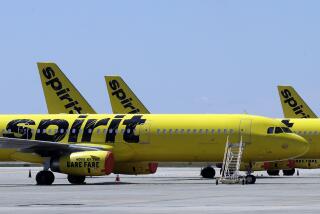Capital flight
- Share via
IN AN INCREASINGLY GLOBAL economy in which national borders are becoming just lines on a map, the federal government gives U.S. airlines an archaic “protection” many of them don’t want. A 1938 law limits foreign ownership of a domestic airline to no more than 25% of an airline’s voting stock, effectively barring foreign control of U.S. airlines.
The Bush administration and several airline CEOs have called for the cap to be raised to 49%, still not enough to allow foreign control but a positive step that would give ailing domestic airlines access to a larger pool of capital. But in 2003, when it last considered the issue, Congress gave in to labor union fears that foreign owners would lay off U.S. workers.
The foreign ownership ban prevents U.S. airlines from consolidating with overseas carriers, an action many airline CEOs and analysts say is necessary. In April 2005, United Airlines CEO Glenn Tilton, who knows a thing or two about ailing carriers, said he was alarmed that U.S. carriers were “”not leading the process” in consolidating the world’s airlines.
Cross-border mergers are common, especially when a company is in economic distress. Before AT&T; Wireless was taken over by Cingular in February, it was close to a merger with Britain’s Vodafone Group. It makes no sense that U.S. airlines, inherently global in scope, can’t do the same.
By any measure, a U.S. airline owned by a foreign firm would still be American; a majority of its shareholders just wouldn’t be. When Air France bought Netherlands-based KLM in 2004, KLM still flew as a Dutch national carrier and had Dutch employees -- it was just owned by a company based in France.
The government should allow U.S. airlines the same cross-border mergers that are common in other industries and are increasingly necessary for businesses to survive. U.S. laws cut off too many potential investors from the U.S. airline industry simply because they’re not U.S. citizens. That may be good politics, but it’s bad policy.
More to Read
Inside the business of entertainment
The Wide Shot brings you news, analysis and insights on everything from streaming wars to production — and what it all means for the future.
You may occasionally receive promotional content from the Los Angeles Times.









